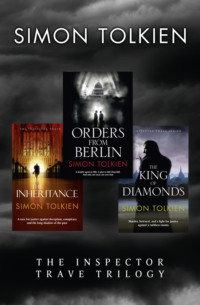Sadece Litres'te okuyun
Kitap dosya olarak indirilemez ancak uygulamamız üzerinden veya online olarak web sitemizden okunabilir.
Kitabı oku: «Simon Tolkien Inspector Trave Trilogy: Orders From Berlin, The Inheritance, The King of Diamonds», sayfa 4
Bir şeyler ters gitti, lütfen daha sonra tekrar deneyin
Türler ve etiketler
Yaş sınırı:
0+Litres'teki yayın tarihi:
29 haziran 2019Hacim:
1244 s. 8 illüstrasyonISBN:
9780007590698Telif hakkı:
HarperCollins